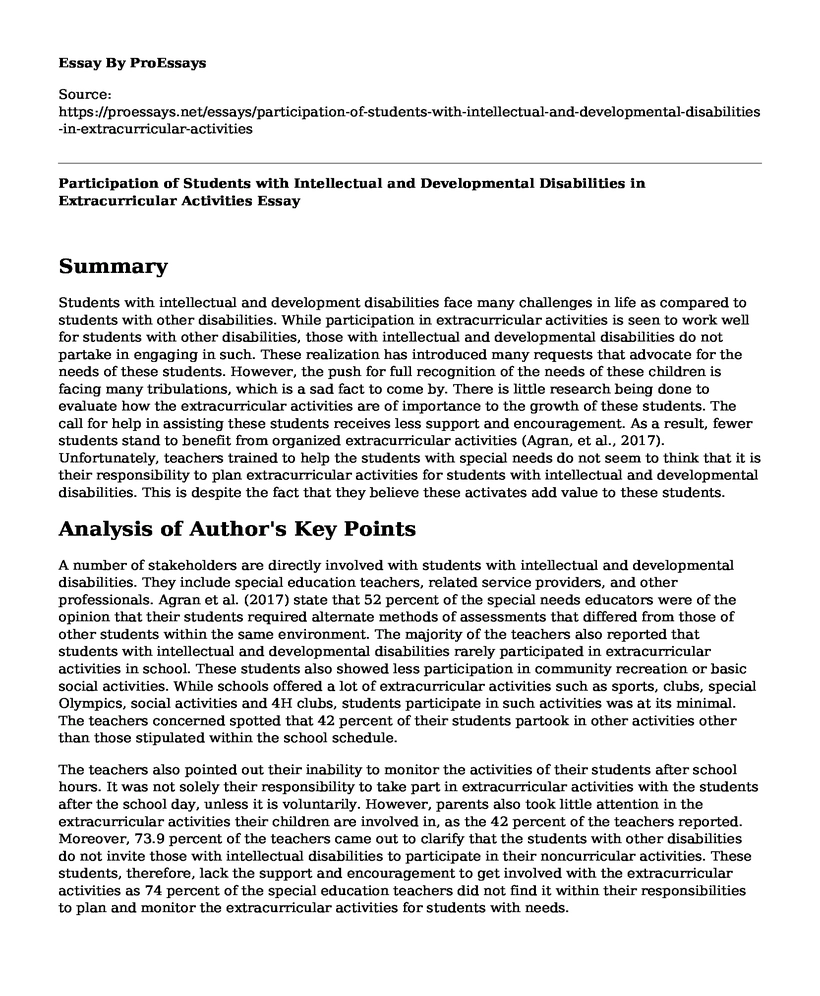Summary
Students with intellectual and development disabilities face many challenges in life as compared to students with other disabilities. While participation in extracurricular activities is seen to work well for students with other disabilities, those with intellectual and developmental disabilities do not partake in engaging in such. These realization has introduced many requests that advocate for the needs of these students. However, the push for full recognition of the needs of these children is facing many tribulations, which is a sad fact to come by. There is little research being done to evaluate how the extracurricular activities are of importance to the growth of these students. The call for help in assisting these students receives less support and encouragement. As a result, fewer students stand to benefit from organized extracurricular activities (Agran, et al., 2017). Unfortunately, teachers trained to help the students with special needs do not seem to think that it is their responsibility to plan extracurricular activities for students with intellectual and developmental disabilities. This is despite the fact that they believe these activates add value to these students.
Analysis of Author's Key Points
A number of stakeholders are directly involved with students with intellectual and developmental disabilities. They include special education teachers, related service providers, and other professionals. Agran et al. (2017) state that 52 percent of the special needs educators were of the opinion that their students required alternate methods of assessments that differed from those of other students within the same environment. The majority of the teachers also reported that students with intellectual and developmental disabilities rarely participated in extracurricular activities in school. These students also showed less participation in community recreation or basic social activities. While schools offered a lot of extracurricular activities such as sports, clubs, special Olympics, social activities and 4H clubs, students participate in such activities was at its minimal. The teachers concerned spotted that 42 percent of their students partook in other activities other than those stipulated within the school schedule.
The teachers also pointed out their inability to monitor the activities of their students after school hours. It was not solely their responsibility to take part in extracurricular activities with the students after the school day, unless it is voluntarily. However, parents also took little attention in the extracurricular activities their children are involved in, as the 42 percent of the teachers reported. Moreover, 73.9 percent of the teachers came out to clarify that the students with other disabilities do not invite those with intellectual disabilities to participate in their noncurricular activities. These students, therefore, lack the support and encouragement to get involved with the extracurricular activities as 74 percent of the special education teachers did not find it within their responsibilities to plan and monitor the extracurricular activities for students with needs.
Personal Response
In my opinion, special education teachers should push for research to be done on the extracurricular activities that are suitable for students with intellectual and developmental disabilities. A strictly defined research would formulate several noncurricular activities to help students with intellectual disabilities. Extracurricular activities would develop and refine the social and interpersonal skills of these students thus enabling them to perceive their environment in a friendlier way. The involvement in extracurricular activities would also help these students to improve on their post-school activities, a move that would make such students extend their lively attitude past the walls of the school.
References
Agran, M., Andrew Wojcik, Cain, I., Thoma, C., Achola, E., Austin, K. M., . . . Tamura, R. B. (2017). Participation of Students with Intellectual and. Education and Training in Autism and Developmental Disabilities,, 3-12.
Cite this page
Participation of Students with Intellectual and Developmental Disabilities in Extracurricular Activities. (2022, Mar 11). Retrieved from https://proessays.net/essays/participation-of-students-with-intellectual-and-developmental-disabilities-in-extracurricular-activities
If you are the original author of this essay and no longer wish to have it published on the ProEssays website, please click below to request its removal:
- Computers for Students With Special Needs Essay
- How Parents Can Promote Good Reading Habits in Their Children Essay
- Essay Sample on Euphemism and Dysphemism
- Paper Example on a New Leader's Frugal Blueprint: Ensuring Student Wellbeing
- John's Character Development: From Trust to Mistrust at Age Two - Essay Sample
- Free Paper on Becoming an Ideal Teacher: Igniting Creativity and Imagination
- Free Essay Example: The Child Ballad in America







